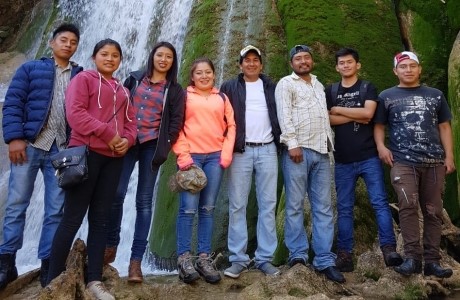Since COVID-19 struck, life has changed for entrepreneurs and businesses around the world. Due to lockdowns and movement restrictions, smallholder farmers and rural businesses have been unable to access markets and sell produce or other products. As they often have little or no access to social security, rural youth disproportionately suffer from the pandemic’s restrictions on businesses. In general, youth also already face higher unemployment and underemployment rates compared to adults.
However, well-versed in technology, young agripreneurs are quickly adapting their business models and using digital tools to their advantage. Accepting online orders with mobile payments, offering home delivery, marketing products on social media, using ICTs to work from home and taking online classes to acquire new skills are just some of the ways that youth are using this opportunity for growth and innovation.
FAO launched a youth engagement initiative, Coping with COVID-19: voices of young agripreneurs, at the end of March 2020 to understand the impact of the outbreak on the businesses of young rural people and to know how to best support them during and after the pandemic. Through networks and groups of young farmers and agripreneurs across Africa and Central America, the initiative identified youth-led solutions to cope with the crisis. This has informed FAO’s policy advice to governments and resource mobilisation efforts to advocate for youth-inclusive responses.
Here are just three young agripreneurs proving that the pandemic won’t get them down:
Karina and her team (Left/top) and Arthur (Right/bottom) have changed their business models to make them work during the pandemic. Left: ©Avantichajil Right: ©Khainza Energy
From ecotourism to online food service in Guatemala
Six months ago, 22-year-old Karina Brito was ready to launch her new business. Together with a group of 20 young entrepreneurs from Nebaj, Guatemala, she had started a company called Avantichajil – an indigenous Ixil word meaning “sowers of life”. With support from an FAO-led programme and training from the National Forest Institute, their plan was to offer agro-ecotourism services, like forest tours and cooking lessons, and sell wooden furniture. But when COVID-19 arrived, everything was put on hold.
National movement and business restrictions forced Karina and her team to suspend the ecotourism activities, as well as the manufacturing of furniture. They quickly realised they couldn’t let their business fall to pieces, so they began looking for a way to diversify their services.
They decided to use the ‘Ixil Gastronomy’ component of their company as the new focus. The business was originally going to offer traditional dishes from the local Ixil indigenous community and cooking classes for tourists. Now the team organised themselves to produce local food and sell it online. They offer smoked meat, plantain, banana bread, smoothies, coffee and more. To abide by physical distancing rules, they created an online profile, called MercaRed, to promote and sell products of seven different youth-led agribusinesses in their area. Their venture is still new, but the results are already encouraging.
“If we had remained focused on the initial project, I don’t know where we would be now. You have to take some risk, step forward and innovate and learn by making mistakes”, says Karina.
Offering clean energy in Uganda
29-year-old Arthur Woniala is a co-founder and project engineer at Khainza Energy, a youth-led company committed to reducing Ugandan households’ reliance on wood fuels by offering biogas as a clean, affordable and sustainable alternative. They package biogas in recyclable cylinders and provide training on how to use it.
The disruptions to public transport in response to COVID-19 left millions of Ugandans without access to basic services such as cooking fuel. Khainza Energy is trying to bridge this gap. Arthur has been limiting physical contact by advertising and collecting orders via social media and accepting mobile money payments. Going one step further to keep Ugandan communities informed during the pandemic, he delivers flyers with advice from the Ministry of Health alongside his orders.
Whilst he cannot deny that the last few months have been tough for his business, Arthur remains firm. “We are committed to ensure that people still have access to basic services,” he says proudly.
By taking orders on social media and making home deliveries, Adeline has managed to keep her mushroom business afloat. ©Adeline Umukunzi
Selling produce in Rwanda
Social media has also been a lifeline for 25-year-old Rwandan Adeline Umukunzi. Before the pandemic, she sold mushrooms to hotels, restaurants and wholesalers. Big sales were important, as she produced a daily harvest of 100 kilograms. However, with the COVID-19 outbreak and consequent lockdown, demand from clients had dried up. Many businesses closed, and with severe curtailments to public transport, she couldn’t get her products to market.
Adeline owns no facilities to store and refrigerate unsold goods, so in order to sell her produce as quickly as possible, she has moved to selling directly to individuals. Adeline has been advertising her products on social media and asking customers to spread the word. She has increased her labour force and bought a bicycle to be able to expand her delivery route.
FAO support to rural youth
Through partnerships with rural youth organizations, FAO has worked with young agricultural workers and entrepreneurs to understand their needs and mitigate the negative effects of the pandemic.
Only one in every 10 youths reported receiving COVID-19 relief from local governments or other development actors. Despite this and the negative business outlook, it is inspiring to see how many youths are looking at the crisis as an opportunity to innovate. The problems faced by Karina, Arthur and Adeline over the past months are common, and their solutions are proof of youth’s ingenuity and resilience in the face of crises. Judging by their amazing response to the COVID-19 challenges, the youth of today are well-equipped for the future.










